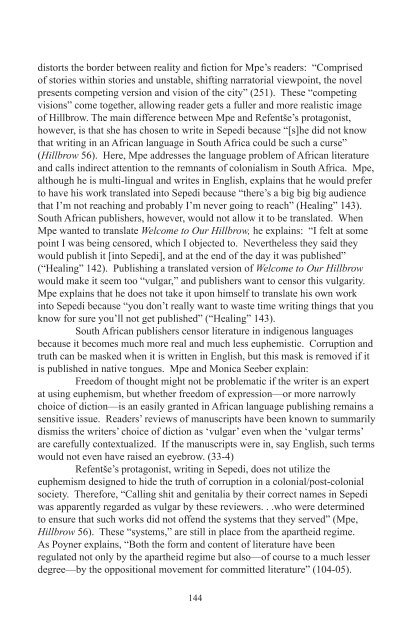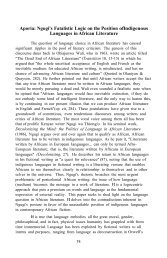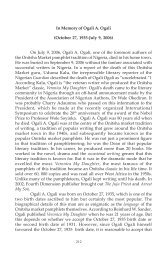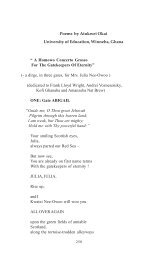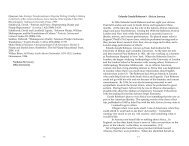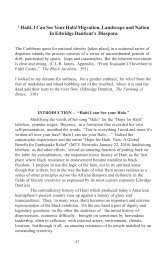Metafiction in Mpe's Welcome to our Hillbrow - African Literature ...
Metafiction in Mpe's Welcome to our Hillbrow - African Literature ...
Metafiction in Mpe's Welcome to our Hillbrow - African Literature ...
You also want an ePaper? Increase the reach of your titles
YUMPU automatically turns print PDFs into web optimized ePapers that Google loves.
dis<strong>to</strong>rts the border between reality and fiction for Mpe’s readers: “Comprised<br />
of s<strong>to</strong>ries with<strong>in</strong> s<strong>to</strong>ries and unstable, shift<strong>in</strong>g narra<strong>to</strong>rial viewpo<strong>in</strong>t, the novel<br />
presents compet<strong>in</strong>g version and vision of the city” (251). These “compet<strong>in</strong>g<br />
visions” come <strong>to</strong>gether, allow<strong>in</strong>g reader gets a fuller and more realistic image<br />
of <strong>Hillbrow</strong>. The ma<strong>in</strong> difference between Mpe and Refentše’s protagonist,<br />
however, is that she has chosen <strong>to</strong> write <strong>in</strong> Sepedi because “[s]he did not know<br />
that writ<strong>in</strong>g <strong>in</strong> an <strong>African</strong> language <strong>in</strong> South Africa could be such a curse”<br />
(<strong>Hillbrow</strong> 56). Here, Mpe addresses the language problem of <strong>African</strong> literature<br />
and calls <strong>in</strong>direct attention <strong>to</strong> the remnants of colonialism <strong>in</strong> South Africa. Mpe,<br />
although he is multi-l<strong>in</strong>gual and writes <strong>in</strong> English, expla<strong>in</strong>s that he would prefer<br />
<strong>to</strong> have his work translated <strong>in</strong><strong>to</strong> Sepedi because “there’s a big big big audience<br />
that I’m not reach<strong>in</strong>g and probably I’m never go<strong>in</strong>g <strong>to</strong> reach” (Heal<strong>in</strong>g” 143).<br />
South <strong>African</strong> publishers, however, would not allow it <strong>to</strong> be translated. When<br />
Mpe wanted <strong>to</strong> translate <strong>Welcome</strong> <strong>to</strong> Our <strong>Hillbrow</strong>, he expla<strong>in</strong>s: “I felt at some<br />
po<strong>in</strong>t I was be<strong>in</strong>g censored, which I objected <strong>to</strong>. Nevertheless they said they<br />
would publish it [<strong>in</strong><strong>to</strong> Sepedi], and at the end of the day it was published”<br />
(“Heal<strong>in</strong>g” 142). Publish<strong>in</strong>g a translated version of <strong>Welcome</strong> <strong>to</strong> Our <strong>Hillbrow</strong><br />
would make it seem <strong>to</strong>o “vulgar,” and publishers want <strong>to</strong> censor this vulgarity.<br />
Mpe expla<strong>in</strong>s that he does not take it upon himself <strong>to</strong> translate his own work<br />
<strong>in</strong><strong>to</strong> Sepedi because “you don’t really want <strong>to</strong> waste time writ<strong>in</strong>g th<strong>in</strong>gs that you<br />
know for sure you’ll not get published” (“Heal<strong>in</strong>g” 143).<br />
South <strong>African</strong> publishers censor literature <strong>in</strong> <strong>in</strong>digenous languages<br />
because it becomes much more real and much less euphemistic. Corruption and<br />
truth can be masked when it is written <strong>in</strong> English, but this mask is removed if it<br />
is published <strong>in</strong> native <strong>to</strong>ngues. Mpe and Monica Seeber expla<strong>in</strong>:<br />
Freedom of thought might not be problematic if the writer is an expert<br />
at us<strong>in</strong>g euphemism, but whether freedom of expression—or more narrowly<br />
choice of diction—is an easily granted <strong>in</strong> <strong>African</strong> language publish<strong>in</strong>g rema<strong>in</strong>s a<br />
sensitive issue. Readers’ reviews of manuscripts have been known <strong>to</strong> summarily<br />
dismiss the writers’ choice of diction as ‘vulgar’ even when the ‘vulgar terms’<br />
are carefully contextualized. If the manuscripts were <strong>in</strong>, say English, such terms<br />
would not even have raised an eyebrow. (33-4)<br />
Refentše’s protagonist, writ<strong>in</strong>g <strong>in</strong> Sepedi, does not utilize the<br />
euphemism designed <strong>to</strong> hide the truth of corruption <strong>in</strong> a colonial/post-colonial<br />
society. Therefore, “Call<strong>in</strong>g shit and genitalia by their correct names <strong>in</strong> Sepedi<br />
was apparently regarded as vulgar by these reviewers. . .who were determ<strong>in</strong>ed<br />
<strong>to</strong> ensure that such works did not offend the systems that they served” (Mpe,<br />
<strong>Hillbrow</strong> 56). These “systems,” are still <strong>in</strong> place from the apartheid regime.<br />
As Poyner expla<strong>in</strong>s, “Both the form and content of literature have been<br />
regulated not only by the apartheid regime but also—of c<strong>our</strong>se <strong>to</strong> a much lesser<br />
degree—by the oppositional movement for committed literature” (104-05).<br />
144


